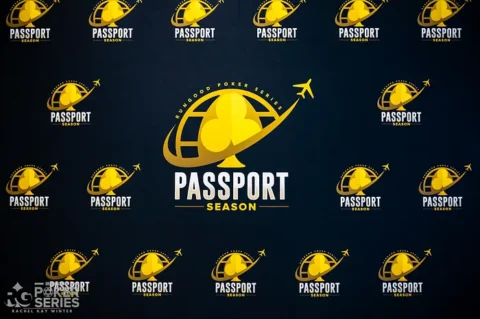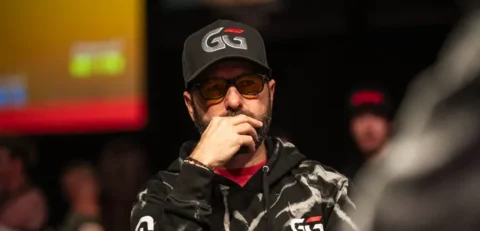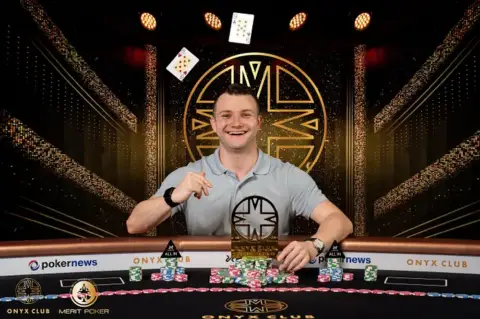Straddling in poker greatly increase the excitement within any poker game.
This action is typically performed by an Under the Gun player in a community card game. Yet some poker game rules permit ANY player to straddle before the hand while allowing unlimited subsequent straddles leading up to the hole cards being dealt.
In this article, we’ll define what straddling in poker is, outline the mechanics behind this poker action, and explain the reasons why it may — or may not — be a good fit for your favorite poker game.

Poker Straddle Explained: What is Straddling in Poker?
A poker straddle is an additional preflop bet that is performed BEFORE any face-down hole cards are dealt to the players at a poker table.
The amount of a poker straddle will usually be TWICE the amount of the Big Blind; which essentially means the “straddler” is increasing the stakes for that specific hand.
That’s all there is to it; so now when some one asks you “what is straddling in poker?” you know how to answer!
In most live card rooms and casinos, the first player with an option to straddle will be the player who will be “Under the Gun” once the hole cards are dealt, but the precise rules of how and when players can straddle may vary greatly per each poker room’s rules.
There’s also a “Button Straddle”, which is pretty self explanatory, and a “Mississippi Straddle” in which any player outside of the blinds positions can straddle.
Poker Straddle Sample Hand
6-Handed Fixed Limit Texas Hold’em Game at $5/$10 Stakes
PLAYER 1: CUTOFF
PLAYER 2: BUTTON
PLAYER 3: POSTS SMALL BLIND ($5)
PLAYER 4: POSTS BIG BLIND ($10)
PLAYER 5: UNDER THE GUN
PLAYER 6: HIJACK (UTG +1)
Before any hole cards are dealt — and assuming that straddling is allowed in this specific game — the Under the Gun PLAYER 5 places $20 into the pot.
PLAYER 5: STRADDLE ($20)
The total pot is now $35.
If no other straddles are forthcoming, then the hole cards are dealt to each player.
Once a player has straddled, that player is no longer first to act during the preflop betting round. The first-to-act position for preflop action will automatically move to the next player who did not straddle before the hand.
This also means that all players will now be required to call a $20 minimum bet in order to continue participating in the hand.
If the action is folded all the way to the players who were originally designated as the blinds, they will likewise be forced to complete the minimum bet of $20 to see a flop, while any raises will increase to double the amount of the straddle (which would be $40 in this case).
PLAYER 6: FOLDS
PLAYER 1: RAISES to $40
PLAYER 2: FOLDS
PLAYER 3: FOLDS
PLAYER 4: CALLS $40
PLAYER 5: CALLS $40
The total pot is now $125.
COMMUNITY BOARD CARDS: x – y – z
PLAYER 4: CHECKS
PLAYER 5: CHECKS
PLAYER 1 BETS $20
PLAYER 4: FOLDS
PLAYER 5: FOLDS
PLAYER 1 wins the pot of $145.
Once a poker hand has been straddled, the minimum Small Bet and Big Bet amounts increase accordingly.
Unlimited Straddling: Throwing Caution to the Wind
As you might imagine, a poker game that allows unlimited straddling can significantly increase the stakes — to a point in which the amounts won or lost during hands far surpass the pre-published limits.
Specialty or novelty private poker games might even have wacky rules that revolve specifically around the poker straddle.
Why Many Poker Pros Love Straddling in Poker
If you’re a highly skilled player, with a proper poker bankroll, who is competing at a table that includes one or more “fish,” then including one or more poker straddle options can represent a way to significantly increase one’s hourly, monetary expectation.
Playing in a $5/$10 No Limit Texas Hold’em game against weak competition with no straddles and a 100 Big Blind cap might be profitable, but playing at a $2/4 NLHE table with loose action and multiple straddles with a 500 Big Blind maximum could be much more profitable.
The larger the actual edge that a superior poker player enjoys over inferior poker players, the more willingness you’ll encounter from a professional to allow straddling… as long as the pro in question is properly “rolled” or “backed” to play in the game.
Poker Straddling is NOT for Beginners
If you’re a beginning poker player who’s simply “learning the ropes” of how to play, you might want to shy away from straddle formats.
There are plenty of live, low stakes poker games in major casinos around that world that offer “three blind” games that equate roughly to what you’d find in a single straddle game anyway.
If you’re just starting out and want to have fun with $500-$1,000 over a prolonged session, see if you can find a $1/$2/$3 three blind with a low maximum buy-in cap for No Limit formats.
Although the rake may be relatively high in these games, you’ll at least get a chance to “weather the storm” a bit if the buy-in maximum is 50 Big Blinds or less.
Fixed Limit poker games are probably the best option for beginning poker players. And while a $3/$6 Limit Texas Hold’em might lack the “all-in shove” action that a No Limit game has, Big Bet amounts for the Turn and River in the Fixed Limit games would be only $12.
Online Poker Sites May Not Offer Straddling Options
Not all online poker rooms allow straddling to take place at the community card game tables.
One other clear benefit for beginners who play online is the ability to compete at micro-stakes — where NLHE buy-in caps can be as low as $2.00 for $0.01/$0.02.
What’s more, most online poker sites allow casual beginning players to play for free, without any monetary risk. These “play money” chips can usually be reloaded without much fuss when busting out, and no deposit is required to play free online poker in most cases.
If this is the route you want to go as a novice poker player who doesn’t want the stress of actual real money gambling, check out our guide for Instant Online Poker Platforms with No Download.
Poker Straddling: Words of Caution
As explained above, straddling in poker is a method used for raising the published stakes of any poker game.
A $5/$10 game immediately turns into a $10/$20 game with just a single straddle, or a $20/$40 game with two straddles, and so on.
If you’re properly bankrolled as a casual player to play $5/$10 Fixed Limit, then stick to games that don’t allow straddles — even if three players are forced to post a blind each hand and even if the rake is high.
It’s that simple.
Weird Card Game Rules and Responsible Gambling
There are a number of clear Responsible Gambling issues that can arise from an impromptu straddle allowance — regardless of whether you’re playing in a licensed casino/card room or in a private home game.
Remember this: while 1-800-GAMBLER and other problem gambling hotlines are typically affiliated with statewide or tribal licensing infrastructures within the United States, resources from these services are routinely consumed by players negatively impacted from non-licensed games.
Funding for these initiatives is often taken directly out of state budgets within regulated jurisdictions. However, this funding doesn’t really account for the significant percentage of professional consultation that is provided as a result of players participating in unlicensed, unregulated gambling activities.
The Land Based Consequences of Virtual, Offshore Vice Trade
In “trade speak,” this equates to offshore gambling sites receiving a verifiable freebie when operating within the U.S. They are able to pluck geographic market share from formally regulated stateside services without having to trouble themselves with social responsibility concepts.
Perhaps live games can be held accountable within corresponding state jurisdictions if/when serious issues arise, but the same cannot be said for unregulated sites that operate offshore.
Got a gambling problem that has worsened due to an offshore site’s lack of deposit limit controls or self-exclusion options?
Go gripe to your local jurisdiction about it and convince them to release more funds for problem gambling initiatives.
Need to talk immediately to a professional after losing your last $x on an offshore site? Before something bad happens?
Call a 24-hour hotline that’s locally funded and maintained by the suckers (citizenry) who — by default — subsidize offshore gaming’s total lack of regard for ring-fenced consequences associated with gambling that occur within any given U.S. jurisdiction.
Having issues cashing out your remaining funds after an unlicensed poker app goes belly-up?
Try lodging a formal complaint with local officials. The offshore regulatory structure of the company means it will likely be immune from local/state prosecution, but hey… you might still be able to sell the defunct promissory for pennies on the dollar if you keep your head down.
Straddling is Best for High Stakes and/or Celebrity Poker Games
Having now relayed my own words of caution, I’m pretty much of the opinion that poker straddles are best reserved for high stakes and/or celebrity environments. While typing this, I’m thinking of high profile games that are televised with all participating competitors made well aware of the rules for straddling before any real money action begins.
Watching high stakes straddling games online can be a lot of fun. The increased stakes and subsequent short-stack action that plays out once a hand is straddled multiple times makes for great video content on sites like YouTube and Twitch.
But again, you probably want to stay away from straddling if you’re new to poker or have a very limited bankroll.
Stick with low stakes Fixed Limit games until you’re dedicated enough to buy premium poker courses, and let the high stakes “ballers” take care of promoting the game through high profile straddles (in my opinion).
Tips for Discouraging Impromptu Straddles in Your Casual Home Game
Introducing a straddling element into a casual home game may cause it to break up or cease to exist before a single session concludes.
Below are a few ways that players can discourage (or get out of playing in) poker games that allow players to straddle.
“Ugh. I didn’t know that straddles were going to be in play. Let me go to the store right quick to check my balance and see if I can withdraw enough to play in today’s/tonight’s game.”
After communicating this, you can insist on driving away if straddling is going to be allowed for any hand.
Of course, this assumes that the game you’re playing in doesn’t allow players to compete on credit.
“I only like straddling in Fixed Limit games.”
Suggesting that a No Limit game switch to a Fixed Limit format can be a show-stopper in and of itself. Something akin to asking players if they wish to slide down a banister of razor blades, butt-naked into a tub of rubbing alcohol.
Players might be willing to see things your way when faced with the sudden prospect of switching from NLHE to LHE in order to accommodate straddles.
“I’m going to take a break.”
Standing up and insisting on being dealt out of the next poker hand at a home game can likewise disrupt the natural flow of a session.
This can also alert the host that you might not be comfortable exceeding the published stakes via straddling.
If you’re worried about making too much of a scene, or “causing issues” among your home game buddies, who may not wish to “take the foot off the gas pedal” and switch to Limit Hold’em, you can always propose switching to mixed games, the overwhelming majority of which are played fixed limit. This forces “a lowering of the stakes” while at the same time retaining the challenging and interest elements of the game overall.
Overall Poker Straddle Awareness
Higher stakes, short-stack play, and larger bankrolls: three concepts to keep in mind when it comes to straddling in poker. Here’s a little more on straddles from Run It Once founder Phil Galfond.
Insist that any allowances for straddles be communicated in advance when competing at the live tables. That way, you can keep your options open and select another game or table if you don’t agree with the rules.
If you DO find yourself in a game in which straddles are accepted, make sure to take the higher stakes into consideration and adjust your starting hand range accordingly.
And if the action gets too stressful at any time, stand up (or sit out) until you’re comfortable rejoining the table.
Best of luck at your next poker game!












